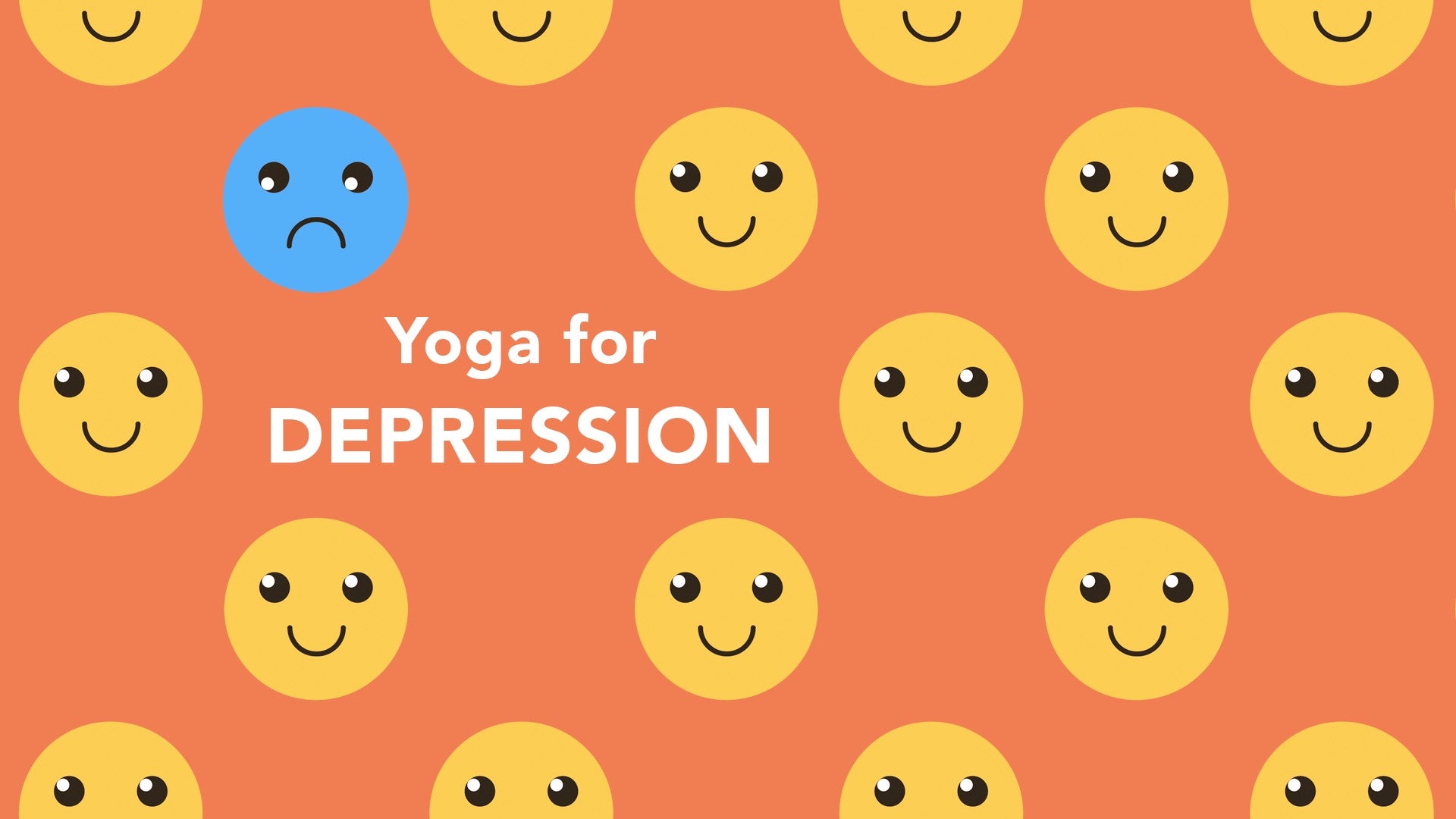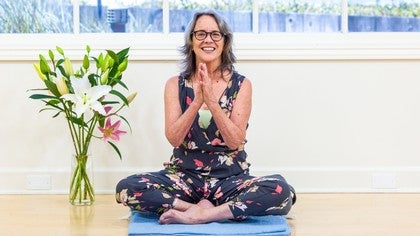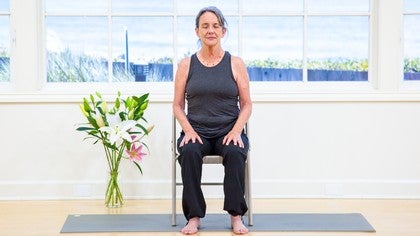Description
About This Video
Transcript
Read Full Transcript
Welcome. Today we're going to be talking about anxiety and depression. And I know for a lot of us, it's either one or the other. It's like, I'm anxious, I'm not depressed, or I can't even get out of bed. How could I possibly be anxious? But in fact, I'd like to talk about how they really are two sides of the same coin. We'll also take a look at what's happening in the body so you get a better understanding of what you have to work with. We'll start with looking at what happens in the brain. Then let's move into what's happening with the autonomic nervous system, the fight-or-flight, rest-and-digest part of our system. And then really, yoga to the rescue, right? I mean, why does yoga work? What's going on? And what's particularly exciting is that we get to talk about the fact that Western researchers are suddenly embracing this practice as a really powerful antidote to both anxiety and depression. So just take a moment to settle in. Simple, simple definitions here. And I'm sure that as someone who's anxious or depressed, you probably already know how you feel. But in anxiety, anxiety is a disorder of nervousness. It's a sense of feeling agitated, sense of apprehension. Sometimes it can escalate and turn into panic attacks, not being able to ground, not being able to sort of a sense of free-floating anxiety. I can't seem to get out of my way and everything is agitating. Everything is a potential problem. So we may end up spending a lot of our time in what psychologists call rumination, which is being stuck in the past and really reliving, oh my god, I can't believe I did that. Was I thinking? And then obsession, which is worrying about the future. Depression, although it seems to be opposite, depression really is loss of interest. I don't actually think of it as sadness, although certainly there is that element of sadness, this element of hopelessness. I think of anxieties being helplessness. I think of depression as being hopelessness. I don't necessarily think of depression particularly the major depressive disorder. That's really a persistent sense of hopelessness and I don't actually think of it as being full of emotion. I think of depression as being numb and almost being devoid of emotion. I can't even get it up to feel anything. A lot of researchers suggest that anxiety and depression are more women's issues. I have to say that I'm not sure I agree with it, although if you look at statistics they'll say well see, more women suffer from depression and anxiety than men. But a couple things are going on there and I just I just want to mention them really briefly and that is that yes, women are more likely in times of our lives in the stages of our lives for our hormones to fluctuate and so we may see an uptick in anxiety or depression after having a baby during menopause, perimenopause and that's not because we have hormones, it's because they're fluctuating wildly and the poor body is trying to find stasis. So yes, we may see those upticks and also women are more likely to own it. Women are more likely to say God, I feel really depressed. Women are also more relationship connected and so we tend, and I know it's a broad generalization, but we tend to worry about the effects of our actions on relationships. Third, we are way more, really way more willing to get help and to say tell me what's going on, let's let's look at this. And finally women live longer than men and so for the aging population when you you know lose so many of your friends as you get older there's a lot of loneliness sometimes and that can be associated both with anxiety and depression. So let's start by looking at the brain. There are two parts of the brain that are particularly relevant to what we're talking about and I want to say really quick that there's a website called WiseBrain, I think it's dot org, that's run by a man by the name of Rick Hansen and so feel free to take a look. He has so much really good stuff to say and a lot of what I'm summarizing comes from my understanding from him and from other scientists. But let's take a look at a part of the limbic part of the brain called the amygdala. That is the center of emotions, particularly fear and aggression. There's an old saying that neurons have fired together, wired together. So the more that we are fearful, the more that we are feeling shame or really negative emotions, the more those neurons, the more we strengthen those neurons. And the other aspect of the amygdala is that it's a home of what's called implicit memory. Implicit memory we all have, thank goodness, because every time you would get on a bicycle you would have to remember exactly how it is that you ride a bicycle. So a lot of who we are, a lot of our everyday life is made up through implicit memory. Implicit memory though can also color what we do in our everyday life. So implicit memory is also called emotional memory. So for example if I decide that I am upset and I want to say something to someone who's upset me, that may trigger a memory that I don't even know quite where it came from or what it's really about, but suddenly I am unable to voice my upset because I'm triggered by something that happened a long long time ago. And so that implicit memory starts to color what's really actually happening. So when we're fearful, when we're anxious or depressed, we actually build up and in strengthen the amygdala center of the brain. And then what else is going on in the brain is that there's a home of explicit memory and that's called the hippocampus. The explicit memory is what actually happened, very straightforward. That's exactly what happened, right? The problem is when we're anxious and depressed and we're feeding this fear, we're feeding our insecurities and our shame or whatever it is that that we our triggers are about, we are actually decreasing our ability to understand, to have explicit memory, to understand that this is right now and I am merely voicing my displeasure or I merely whatever it is that I'm doing suddenly is colored by my fear, my agitation, my all of the old stuff that has happened to me. So the hippocampus, researchers say, actually shrinks. So we have this overabundance of fear and triggers and an underdeveloped sense of what's really true. So in essence what that means is that our fear and our implicit memory stops us from being present to what's true. Everything that we're doing suddenly becomes colored and layered by what was or what we perceive could be. So now let's take a look at the other aspect of the body and that's the autonomic nervous system which obviously takes care of pretty much all of the body's systems and movements. Two particular aspects of that are the sympathetic nervous system and the parasympathetic. Okay so I could go over the whole saber-toothed tiger thing again that you've heard a million times but the sympathetic nervous system is the fight-flight or freeze element of the nervous system. It's actually a really good thing to have. It gets you up in the morning, it helps you stand up, it helps you move through the world, it helps you inhale. That's all really positive aspects of the nervous system. It also keeps you aware. The body, the mind is more apt actually to go toward the negative in our lives for a reason because what we want is we want the mind to kind of take a look at the body and discover whether I'm in trouble or whether I'm safe and so the mind kind of does this little scam goes okay yeah yeah you're fine oh oh my god I think it's time to run. So then the parts of your body, the systems in your body that need to be activated can be activated and of course as scientists and all of us say over and over again right that the nervous system gets stuck in the sympathetic sympathetic nervous system aspect of it and I think of the sympathetic nervous system is our relationship to the external environment and sometimes yes that brings us into conversations internally but the way I see it is it's our relationship to what is what is happening out there and how we are we are responding to that. It's easy in our culture to get over stimulated. I've heard others say that depression is actually a suppression of the central nervous system I'm sorry of the sympathetic nervous system but in actuality it really it really is not it's really the same as anxiety it's really an over stimulation of the sympathetic nervous system. When we think about it it's really stressful to be depressed it's really stressful to not be able to get up and and and be in your life right and also being depressed just like with anxiety suppresses the feel-good neurons and hormones in our body and so we feel pretty awful so it really is about balancing and bringing up the parasympathetic and balancing the sympathetic and bringing it back down to stasis. So the parasympathetic nervous system is called rest and digest but it's also tend and befriend and that's what I think yoga is about right even it's really about caring for ourselves and it's about taking care of our internal environment it's about moving into relationship with ourselves in a way that's caring patient and generous. The biggest part of the parasympathetic nervous system that has to do with emotional health is what's called the vagus nerve and the vagus nerve is toning the vagus nerve is really and truly why yoga works for anxiety and depression so let's take a look at that.
So the vagus nerve it seems to be right these days to be sort of the darling of of neural research the vagus nerve is also called the wandering nerve and it really kind of it starts at the cervical spine and it it literally wanders through the body and yogis think of it as the way of sort of checking in with all of our different systems how is that digestion happening what's going on with heart rate how are we doing over here how are we doing over there so the beauty of it is is even researchers are beginning to see that this particular nerve could very well be the link between the mind and the body it gives early warning signs of what's what's happening in different systems so it's really important for the vagus nerve to be toned and stimulated so can do its job so I like to think of the vagus nerve as synonymous with the wisdom mind of Vajrayana Vajrayana maya kosha which which helps us make sense of our experiences because everything that we digest including emotions as well as food everything that we do everything that we experience everything we breathe in and exhale out is touched by the vagus nerve the vagus nerve tonality is increased and stimulated by resistance breathing and we know that in yoga of course as ujjayi or breathless sound it's it's stimulated by exhalations and exhalations just the very act of exhaling will bring up the parasympathetic nervous system the very act of inhaling or holding one's breath stimulates the opposite the sympathetic nervous system so it makes sense to increase tone of the vagus nerve exhaling and particularly exhaling with sound my favorite treatment for vagus nerve stimulation is what's called cold water treatment splashing really cold water on your face really helps stimulate vagus nerve so why would you want to do that because low vagal tone just think about low vagal tone pulls our energy down it creates it creates the environment for depression for PTSD for our inability to react appropriately so it decreases our ability to reset our heart rate and calm down after something particularly troublesome has happened so what the studies what's happening right now in Western studies is that they're taking a look at yoga and and the fact that yoga is is really really helping increase vagal tone and what I love about Western research is they can't quite figure out why yoga works and to me it just seems so obvious that if vagal tone is increased excuse me by resistance breathing by exhalation by relaxation by interoception which means the understanding of what's happening in my body and now we're puzzled by why yoga works huh so why don't we take a look at just you know a dozen or so reasons why indeed yoga works so why does yoga work to balance out the nervous system to really help us not feel so anxious or to kind of release the sense of depression the sense of sunken chest loss of interest first and foremost yoga is what mr. Iyengar calls a bottom-up practice not a top-down what does that even mean bottom up is you know what what's happening here where am I what's happening in my body not so much what my mind is dictating or thinking about or hoping to happen it's it's what we call it interoceptive practice that is the ability to look inside hopefully with minimal if not no judgment to just see what is here at this moment yoga gives us the ability to be present and take action so our practices bring us inside say huh okay what's going on and now I actually have the ability using asana pranayama meditation whatever those tools are to come back to balance yoga also or as a result of those practices it keeps us less reactive and interesting what studies are showing which I find just so much fun is that yoga does this better and and the effects are are longer lasting than simply exercising going out for a run which you know is really actually great or or going and being in social having social interactions which are also really important but yoga seems yoga's effects seem to last longer but and this this is really important it only the effects only last longer if we incorporate and connect with all of what yoga is about which means that we go on beyond asana and yes asana is super important because once again this is a bottom-up practice we are our bodies are what are suffering the effects of the anxiety and depression so we need asana but then we need to regulate the breath how does the vagus nerve stimulate and be toned through the agency of the breath bringing the mind in to our experience so that's really important that we look at not just our bodies on this mat not even just our breath on this mat but how do we interact in our world how do we come into contact so the the yamas and the niyamas how do we take care of others how do we take care of ourselves meditation super important but not until we move through the body so it's the entire practice that we're looking at so one way that yoga works is to remember that depression is learned hopelessness and anxiety is learned helplessness so when we turn to yoga what yoga is saying is here are practices that can quiet and calm the mind these are practices that keep us so grounded in our present moment experience that the way I see it is it's kind of no room for feeling hopeless kind of no room for rumination or obsession so not that you can be on your mat 24-7 honestly but it's this combination of breathing moving hearing and feeling that really is the combination that we're looking for when we're dealing with anxiety and depression and finally yoga teaches us that we are not our feelings that feelings are a lot like thoughts they come they arise they abide they dissolve and once again mr. Iyengar distinguishes between emotions and feelings in what I think is a really useful way that is that feelings keep us in the present feelings are what we're feeling right this moment I feel angry I feel anxious I feel joyful that's happening at this moment but emotions are feelings that are laced with a story that are stuck in a story and so where I might be angry right now because of something that is happening suddenly and then that's a sensation and I can feel that in my jaw my neck maybe I'm clenching my fists and I think huh that's where my anger is feeling and intention but then if I start to ruminate about the fact that I was angry at this action and oh my gosh that always happens to me and I can't I cannot believe that it's happening again and when I was seven years old this happened that those are emotions that keep keep us really tethered and tethered to the past and suffering so we've kind of gone in in this particular talk we've gone through the definitions of anxiety and depression we've taken a look at what's happening in the body in the brain really took a look at at why yoga works with the mechanisms are and I hope that within all of this that you've been able to make some sense perhaps if you are suffering from anxiety depression you've really made it might make a little bit more sense what's going on and perhaps show you a way that that will at least soften around what you're going through so we focused a lot today on the Western approach to what's going on right and even the Western understanding of why yoga works I am a particularly interested in what the ancients say so the Westerners tell us what they think the yogis show us what they know so I think in our next time together let's explore that a little bit and see where we land and in the meantime I look forward to hearing some more of your experience in and how this how this fits into your own understanding so till next time
Yoga for Depression: Linda Sparrowe
Comments
You need to be a subscriber to post a comment.
Please Log In or Create an Account to start your free trial.











